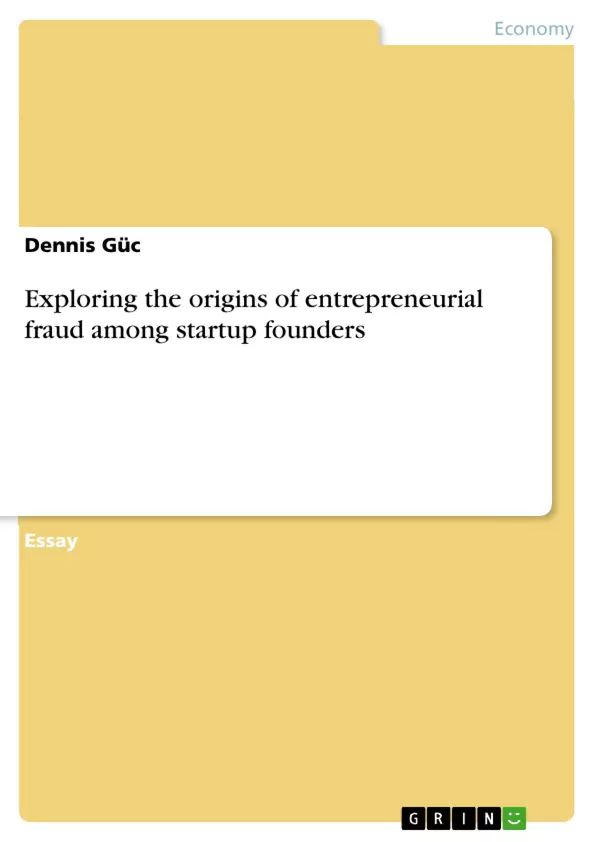This thesis will investigate the factors and characteristics that are driving and facilitating the fraudulent behavior of founders in an environment of startups, leading to the following research question: What are the characteristics and factors that drive startup founders to commit entrepreneurial fraud?
To show a highly accurate depiction of the origins of entrepreneurial fraud, this thesis will conduct a quantitative case study. The utilization of the case study approach is particularly advantageous when there is a requirement to gain a profound understanding of a specific issue, event, or phenomenon within its authentic real-life context.
In recent years, startups emerged as a driving force behind job creation and innovation. The startup sector in Germany employed over 415,000 individuals in 2020, with numbers expected to grow even further. North America dominates the global unicorn landscape, accounting for 51% of the total, while Asia follows closely behind with 34%. Europe, on the other hand, only represents 12% of the world’s unicorns. As of 2022, 25 of these unicorns – startups with a valuation of more than $1 billion – are based in Germany. Many of these fledgling businesses are characterized by a high innovative potential as well as the risk of failure.
Inhaltsverzeichnis (Table of Contents)
- INTRODUCTION
- THEORETICAL BACKGROUND
- UNDERSTANDING ENTREPRENEURIAL FRAUD
- Defining entrepreneurial fraud
- THE FRAUD TRIANGLE THEORY BY DONALD R. CRESSEY
- Pressure/Incentive
- Opportunity
- Rationalization
- Expanding the triangle: Capability
- OUTCOME HEALTH
- COMPANY HISTORY AND BACKGROUND
- FRAUDULENT ACTIVITIES OF OUTCOME HEALTH
- UNDERSTANDING THE ROLE OF THE FOUNDERS
- INTRODUCTION TO FRAUD PREVENTION AND DETECTION
- ANALYZING THE FRAUD CASE OF OUTCOME HEALTH USING THE FRAUD TRIANGLE/DIAMOND THEORY
- THE PRESSURE/INCENTIVE COMPONENT
- THE OPPORTUNITY COMPONENT
- THE RATIONALIZATION COMPONENT
- THE CAPABILITY COMPONENT
- WHAT TO LEARN AND LOOKING FURTHER
Zielsetzung und Themenschwerpunkte (Objectives and Key Themes)
This thesis examines the characteristics and factors that motivate startup founders to engage in fraudulent activities. It aims to understand the origins of entrepreneurial fraud within the context of startups by conducting a quantitative case study.
- Defining entrepreneurial fraud and its prevalence in the startup sector.
- Analyzing the role of the Fraud Triangle theory and its expansion to explain the motivations and opportunities for fraudulent behavior.
- Investigating the case of Outcome Health to explore the specific factors driving fraudulent activities in a real-world scenario.
- Exploring the relationship between startups, investors, and the potential for fraudulent activity within this dynamic context.
- Identifying potential avenues for preventing and detecting entrepreneurial fraud in the startup ecosystem.
Zusammenfassung der Kapitel (Chapter Summaries)
- Introduction: This chapter introduces the research topic and provides context by highlighting the significance of startups in job creation and innovation, particularly in Germany. It discusses the challenges faced by investors in navigating the uncertainties of startups and the potential for fraudulent behavior within this context. The chapter outlines the research question guiding this thesis, which seeks to understand the factors driving entrepreneurial fraud among startup founders.
- Theoretical Background: This chapter explores the concept of entrepreneurial fraud, defining it and discussing its prevalence within the startup landscape. It examines the Fraud Triangle theory, a well-established framework for understanding the motivations and opportunities behind fraudulent behavior. The chapter examines the components of the Fraud Triangle – pressure/incentive, opportunity, and rationalization – and explores its expansion to include the concept of "capability" as a fourth component.
- Outcome Health: This chapter presents a detailed case study of Outcome Health, a company that experienced significant fraudulent activities. The chapter examines the company's history, background, and the nature of its fraudulent activities. It also focuses on understanding the roles played by the founders in perpetuating these activities.
- Analyzing the Fraud Case of Outcome Health: This chapter applies the Fraud Triangle/Diamond theory to the case of Outcome Health, analyzing each component in detail. It examines the pressures and incentives that motivated the founders' fraudulent behavior, the opportunities they exploited, the rationalizations they employed, and their capabilities in carrying out these activities.
Schlüsselwörter (Keywords)
Entrepreneurial fraud, startup founders, Fraud Triangle, Fraud Diamond, Outcome Health, case study, investor risk, venture capital, transparency, innovation, job creation, financial reporting, corporate governance.
- Quote paper
- Dennis Güc (Author), 2023, Exploring the origins of entrepreneurial fraud among startup founders, Munich, GRIN Verlag, https://www.grin.com/document/1460039



